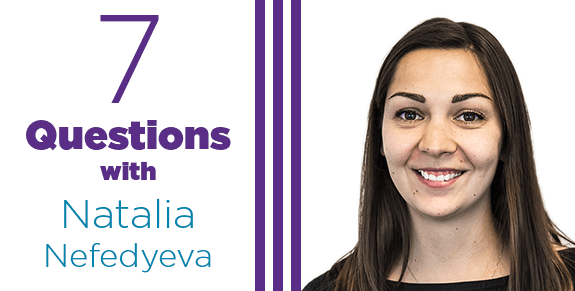
7 Questions with Natalia Nefedyeva
In “7 Questions With…,” we share a brief Q&A with a staff member. In this edition, we hear from Natalia (“Natasha”) Nefedyeva, who joined Rosov Consulting in 2017, bringing extensive experience working with diverse stakeholder groups and project management in a multi-cultural environment.
1. What’s your area(s) of expertise and how has it been beneficial and led to success in your work?
I like to think that I have a unique combination of academic, professional, and cultural background. My degrees in sociology, Jewish Leadership, and nonprofit management provide me with a number of frameworks relevant for our work. In addition, over the past years I’ve worked for or was involved with multiple Jewish organizations in Russia, Israel, and America, who are our former, current, and potential clients. And finally, I’m one of those Russian-speaking Jews, whom everyone in America is interested in engaging. So I hope I can help shed some light on what’s going on in the RSJ community.
2. What experiences have led you into your current career path?
Growing up, I was a beneficiary of many Jewish nonprofits, programs, and projects. I spent years at Jewish overnight camp as a camper and a counselor; I participated in and led Israel trips; I designed and facilitating informal Jewish educational sessions; I lived in a Jewish house (Moishe House). Even my first real job was in the Jewish community. Realizing how much the community has done for me, how much it contributed to me becoming the person I am today, it is a no-brainer for me to give back to this community the best way I can. And for now, this best way is using my skills and knowledge for the benefit of the community.
3. What do you like learning about most through your work?
Some of the best learning lessons for me are around quantitative data analysis. For me, as I’m sure for many others, some of this stuff can be really intimidating, but when you have talented and committed mentors by your side, you’re set for success. And then turning the numbers into a story to tell the client is fascinating. There’s still a lot for me to learn, but I now feel much more comfortable around numbers than I did before joining RC.
4. What do you like most about working at Rosov Consulting?
The best part of working at RC is being a part of this team. People here are smart and funny, extremely competent, and incredibly professional. I enjoy every minute I get to spend in conversations with them, learning from them, and growing with them. Whether it’s a small-scale project or a large team effort, all successes are celebrated and challenges are used for future improvement. There’s incredible amount of support on all levels.
5. What are some challenges of your work?
The best part is working in teams, and the worst part is also working with teams. 🙂 In this field it is nearly impossible to do independent work on the level that RC is delivering. But getting there requires a lot of investment into team work, processes, management, and relationship building and maintaining. For an introvert, that’s a real challenge.
6. What have been the biggest changes in the field and/or your work specifically since you started?
It’s been less than a year since I joined RC. One would say not much can happen in the field in such a short time-frame. But I am lucky enough to work on a project, that I believe, will bring significant change to a part of the field. We are collecting data from multiple youth-serving organizations on the national level to have more insight into today’s Jewish teens, to help organizations measure their impact, and to incorporate data into program planning and professional development. I think it’s a first effort of such scale, and hopefully it will influence these organizations and the teens.
7. How do you think your job and/or the field might change in the next 10 years?
I really hope that within the next 10 years most Jewish nonprofits would integrate data into their work. Understanding the benefits, knowledge, and insight that data bring to the table would elevate their work and justify the resources it takes. While it’s obvious to most for-profit businesses, nonprofits still struggle prioritizing management best-practices, including integrating data into their work.




